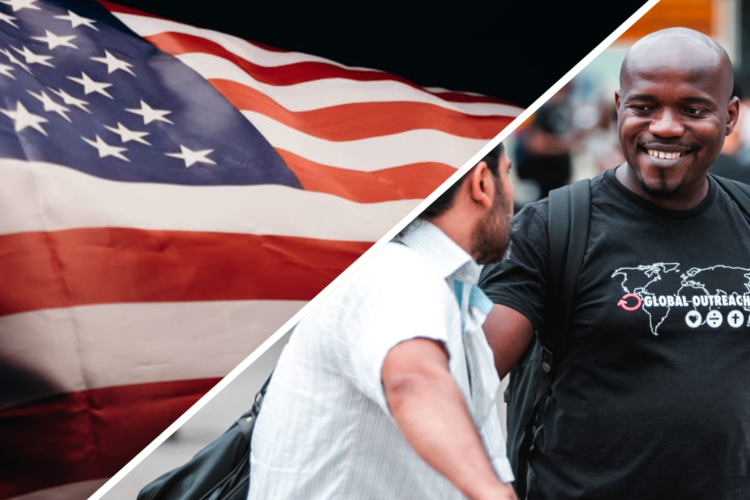
4 Big Lies Christians Believe in Our Fracturing Age
Oversimplified narratives and kneejerk reactions are dividing our society. By extending grace to others and taking a breath to consider their perspectives, we can save our communities from increasing polarisation.
Our world is fracturing.
It’s fracturing across many issues: from politics to race; from climate change to gender. And as it fractures, it becomes more and more tribal. People self-sort into groups that think the same way and often act the same way. And social media turbocharges this polarisation.
These groups may have opposing views on many issues, but they have this one thing in common: they’ve swallowed several lies.
These lies drive how they think about the world, how they talk, and how they act, especially toward those who think differently to them. These lies are fracturing our world.
And Christians are not immune from believing these lies.
We can swallow them if we’re not careful, adding to the polarisation and even dividing our churches. And so, here are four big lies I’ve noticed:
1) The World is Black and White
We can fall into the trap of seeing the world in stark black and white ways.
Good and Bad. Right and Wrong.
Now there are parts of reality that are black and white. The Bible describes many of these bits. For example:
-
Man is destined to die once and face judgement (Hebrews 9:27)
-
All have sinned and fall short of the glory of God (Romans 3:23)
-
There is no other name under heaven by which we can be saved (Acts 4:12)
-
Sex outside of marriage is wrong (1 Corinthians 6:18)
Those things are black and white.
But many things in our world aren’t black and white. And yet, how often do we fall into black and white thinking, especially when it comes to political and cultural issues:
-
Are you questioning the use of long-term lockdowns? Well, you’re not concerned about other people’s wellbeing, but only your selfish freedoms.
-
Do you question Australia having net-zero carbon emissions by 2050? Then you have no care for the environment or others.
-
Does your church mandate mask-wearing? You don’t trust God enough but have succumbed to ‘safetyism’.
Clear cut. Black and White. Case closed.
But notice that in each of the above examples, there are other options — shades of grey as it were — that could explain people’s thinking:
-
A person could be concerned about the use of long-term lockdowns because of their vulnerable neighbours (e.g. single mums with young kids, those with mental health concerns), especially in an environment where a long-term lockdown has thus far failed to stop the spread of the virus.
-
A person could agree with IPCC reports about climate change but disagree about the wisdom of pursuing a particular policy to address it.
-
A church could mandate mask-wearing out of submission to God and government (Romans 13), even as they trust God for their life and wellbeing.
In other words, these issues — like most cultural and political issues — are not so black and white.
There is no clear apostolic ‘once for all delivered to the saints’ response to those issues. They’re tricky. They’re complicated. And so, we shouldn’t put them in the same basket as the Bible’s view of salvation.
But sadly, we Christians often do.
And when we do, the emotional temperature rises to stratospheric heights when others disagree with us. Rather than giving each other space to hold differing views on ‘disputable matters’ (Rom 14), we harden into warring tribes. We lob proverbial hand grenades at each other. We snipe. We fight.
2) The World is Divided Into Good People and Evil People
If the world is black and white, then it’s logical to believe it’s divided into good people (those who think like us) and evil people (those who think differently).
Of course, we might not say this out loud — after all, we Christians know in theory that everyone is sinful (e.g. Romans 3:23, Galatians 5:17).
But in practice, do we divide the world into good and evil people based on their view of climate change, lockdowns, vaccinations — or any number of high stakes issues? Are we tempted to silence them — to cancel them? Whether by tearing down their reputation publicly? Or through today’s weapon of choice: the social media ‘pile-on’?
3) Outrage Trumps Gentleness
There’s no shortage of outrage in today’s polarised world.
In a world that simplifies issues to black and white and sees opponents as evil, as enemies to be destroyed, is it any wonder there’s so much outrage?
And yet, we Christians can hear this tune and sing along to it:
When the Bible says we should be quick to listen and slow to speak (James 1:19), we become quick to judge and fast to anger.
When the Bible says our gentleness should be evident to all (Philippians 4:5), we become known for our harsh tone and the way we condemn others.
When our culture is being torn asunder by culture wars, we join in happily, not exploring more gracious ways of engaging those who oppose us (Colossians 4:6).
4) We Reduce the World To Simple Narratives (and Pick the Ones We Like)
The human brain makes sense of our world through narratives.
This is especially true in an age of information overload. As TGC’s Brett McCracken argues:
‘When a relentless barrage of information hits our brains, it’s easier to file things away in tidy narrative boxes (“This is proof of that”) than to lay them out on a table and see what reality emerges from the evidence. Quickly plugging data into established narratives is a coping mechanism in a world of information overload.’
And so, we go for the narratives that align with our current thinking — or more to the point, our existing feelings — about specific issues.
Whether it’s lockdowns or vaccinations, climate change or race — we all too quickly align ourselves with political and cultural tribes that so often privilege feelings over facts. We don’t grapple with the messy reality: we swallow the simple narrative instead.
And as a result, our churches become increasingly divided along contested political and cultural lines.
The Gospel that Cuts Through These Lies
How can we cut through these lies?
By returning again and again to the Gospel:
Instead of seeing the world as black and white, we realise that we live in shades of grey (apart from a limited number of issues).
Instead of dividing the world into evil people and good people, we remember that we’ve all fallen short of God’s glory. The dividing line between good and evil doesn’t cut between political viewpoints, but through each of us.
Instead of being driven by outrage, we remember the King who was gentle with us. And so, we show gentleness to others.
Instead of swallowing narratives that make us feel good, we work hard to find the truth.
For we serve the God of all truth.
___
Originally published at AkosBalogh.com. Photo by Andrea Piacquadio from Pexels.
2 Comments
Leave A Comment
Recent Articles:
2 May 2024
6 MINS
Things can change, and one never knows what surprises God might have up His sleeve for us. Just when things might seem the darkest, the light of Christ might erupt with brilliance and power.
2 May 2024
5 MINS
Rather than answer the question as to how Australia became a place in which a clergyman cannot stand at his pulpit without fearing for his life, our political masters, champions of diversity, have decided to simply shut down all conversation on social media.
2 May 2024
3.6 MINS
The God of heaven is the God of America. The Lord rules over the United States. This is the truth that we cling to as we pray for revival in America.
1 May 2024
2.9 MINS
The Christian bishop stabbed multiple times in Western Sydney is defending X, and forgiving his young Muslim attacker. Mar Mari Emmanuel used his first sermon since leaving hospital to double down on Christian forgiveness.
1 May 2024
3.8 MINS
We are invited to enlarge God’s eternal family. Sharing the gospel of Jesus Christ is the highest privilege and greatest obligation we have in our short lives on this planet.
30 April 2024
1.5 MINS
The war against Christianity in Australia continues, with the latest shot being fired by the Australian Bureau of Statistics. The ABS are currently finalising questions for the 2026 census, and changes to the question regarding religious faith are particularly telling.
29 April 2024
3.5 MINS
It's almost GO Month – a month for intensified strategic prayer and evangelism. It's time to intercede for Australia and the USA! Join us for the launch tonight!




































Point 1 is so correct
On the vexed issue of vaccinations… You can be pro vaccination while recognizing the risks, and also be pro-freedom. And also respect peoples choices in not being vaccinated.
Yet this is such a divisive issue, which is 1000x more evil
Akos, thank you so much for this post. For me society has become too simplistic, we have lost the ability, will and skill to hold two opposing views in tension and much of life is like that. Take works and grace for example. You can’s just have works without grace and you can’t have grace without works but we are so wrong to cling to either extreme. I loved your scriptural narrative right the way through, thank you and have an awesome Christmas!